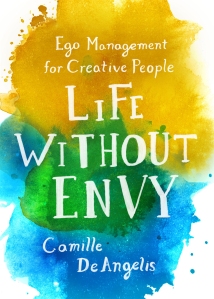(St. Martin’s Press, 2016)

By Michelle Waitzman
Camille DeAngelis is a novelist whose career has had its ups and downs. Like many writers, she often found herself battling self-doubt, jealousy, bitterness, and frustration. She decided that it was time to re-examine her beliefs about herself and her career and, most importantly, to examine her ego and how it was affecting her professional life.
Life without Envy: Ego Management for Creative People will resonate mainly with readers who consider themselves “creators” (authors, poets, visual artists, musicians, etc.). Although it is written from the point of view of a writer, and most of the examples in the book revolve around writing, it addresses common problems with working in any profession where success and failure are often subjective and where both praise and criticism are taken very personally.
Editors may find that this book is not really targeted to them unless they also have a writing career or aspire to have one. Nonetheless, some of the examples are likely to ring true. As an editor, it’s easy to feel envy or frustration after working for months to shape and improve a book, only to see all of the praise and credit for its success go to the author (whose work may not have succeeded without you). Also, many editors suffer from “imposter syndrome,” which is a feeling that you are only pretending to know how to do your job (despite the fact that you are actually well-qualified) and believe that you will be caught out and exposed.
The book may also be helpful for editors who want to gain a deeper understanding of what their authors might be feeling in order to help them get past their psychological barriers. Editors who work as writing coaches, and developmental editors, in particular, might find some useful examples and suggestions in it.
If any of the following statements ring true for you or your clients, Life without Envy may help you to recognize and deal with ego-related issues. Facing these issues can enable you (or your clients) to let go of unproductive feelings and find more satisfaction in your life and work:
- When I see one of my peers succeed, my first thought is that it should have been me instead of them.
- When my friends talk about something that they’ve achieved, it makes me feel like a failure by comparison.
- I won’t feel like a success until I hit a certain milestone in my career, such as being published, winning a specific award, getting good reviews, etc.
- I feel ashamed to tell my friends or family when things aren’t going well in my career.
- If I can’t be the best at what I do, there’s no point in doing it at all.
- I feel like what I do isn’t important enough.
DeAngelis is not a subject-matter expert when it comes to psychology or philosophy. She went on a personal journey (involving a lot of reading) to learn more about these topics in the hope of improving her own life. In Life without Envy, she shares what she has learned, putting it into context for her peers with creative careers.
I found the book to be a bit scattered, taking bits and pieces of wisdom from a number of different sources with no real structure or progression. For this reason, I’m not convinced that it succeeds as a self-help book. However, it has value as a self-examination or self-recognition book for anyone who is feeling frustrated or anxious about their career and can’t pin down why they feel that way. It has some suggestions about how to get past these battles with your ego and lead a happier, more satisfying life, although it lacks a step-by-step plan.
Overall, I found Life without Envy to be a thought-provoking read. It made me examine my own priorities and instinctive reactions in new ways. While it may not provide all of the answers, it can at least help readers to start asking themselves the right questions.
Michelle Waitzman is a freelance non-fiction writer, editor, and proofreader in Toronto. Before she became a freelancer, Michelle survived careers in TV production and corporate communications, after which she ran away to live in New Zealand for seven years.
This article was copy edited by Vanessa Wells.
